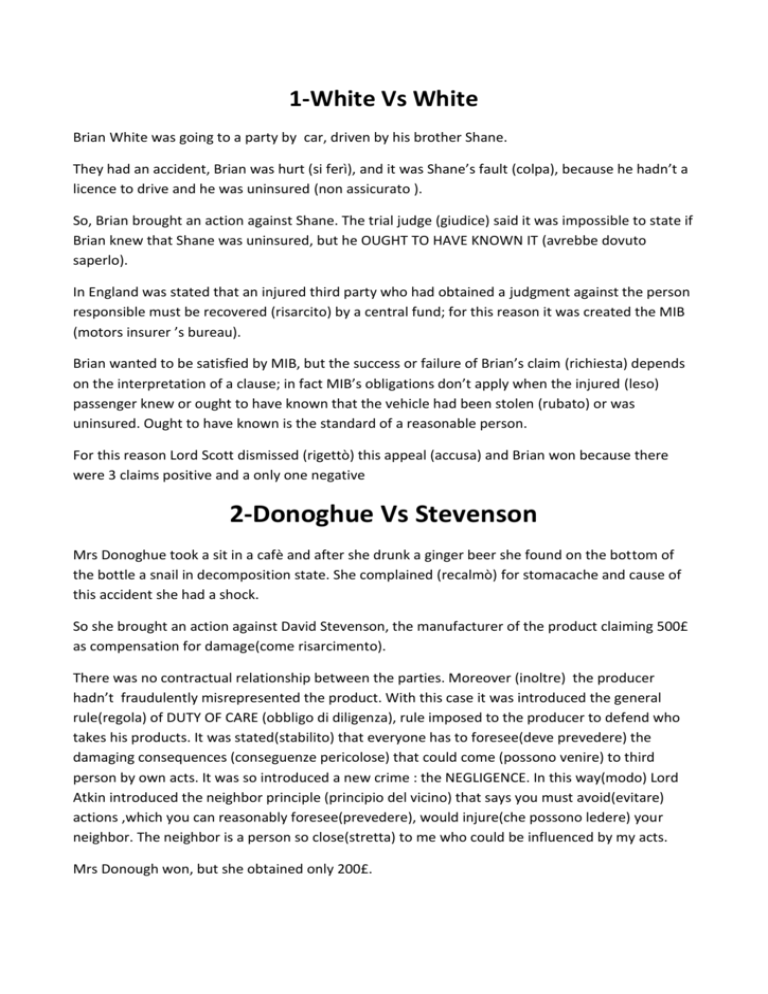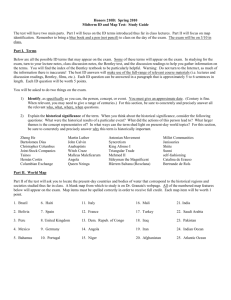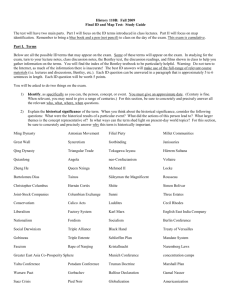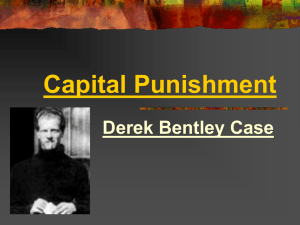1-White Vs White Brian White was going to a party by car, driven
advertisement

1-White Vs White Brian White was going to a party by car, driven by his brother Shane. They had an accident, Brian was hurt (si ferì), and it was Shane’s fault (colpa), because he hadn’t a licence to drive and he was uninsured (non assicurato ). So, Brian brought an action against Shane. The trial judge (giudice) said it was impossible to state if Brian knew that Shane was uninsured, but he OUGHT TO HAVE KNOWN IT (avrebbe dovuto saperlo). In England was stated that an injured third party who had obtained a judgment against the person responsible must be recovered (risarcito) by a central fund; for this reason it was created the MIB (motors insurer ’s bureau). Brian wanted to be satisfied by MIB, but the success or failure of Brian’s claim (richiesta) depends on the interpretation of a clause; in fact MIB’s obligations don’t apply when the injured (leso) passenger knew or ought to have known that the vehicle had been stolen (rubato) or was uninsured. Ought to have known is the standard of a reasonable person. For this reason Lord Scott dismissed (rigettò) this appeal (accusa) and Brian won because there were 3 claims positive and a only one negative 2-Donoghue Vs Stevenson Mrs Donoghue took a sit in a cafè and after she drunk a ginger beer she found on the bottom of the bottle a snail in decomposition state. She complained (recalmò) for stomacache and cause of this accident she had a shock. So she brought an action against David Stevenson, the manufacturer of the product claiming 500£ as compensation for damage(come risarcimento). There was no contractual relationship between the parties. Moreover (inoltre) the producer hadn’t fraudulently misrepresented the product. With this case it was introduced the general rule(regola) of DUTY OF CARE (obbligo di diligenza), rule imposed to the producer to defend who takes his products. It was stated(stabilito) that everyone has to foresee(deve prevedere) the damaging consequences (conseguenze pericolose) that could come (possono venire) to third person by own acts. It was so introduced a new crime : the NEGLIGENCE. In this way(modo) Lord Atkin introduced the neighbor principle (principio del vicino) that says you must avoid(evitare) actions ,which you can reasonably foresee(prevedere), would injure(che possono ledere) your neighbor. The neighbor is a person so close(stretta) to me who could be influenced by my acts. Mrs Donough won, but she obtained only 200£. 3-Hedley Byrne Vs Heller The Hedley Byrne , an advertising (pubblicitaria) company, wanted to know (voleva sapere) from National Provincial Bank some information about the financial state(situazione finanziaria) of the company Easypower, with whom(con il quale) it was going to draw up (stava per stipulare) a contract. N.P.B asked for more informations to Heller Bank which was Easypower’s bank. Heller Bank gave informations, saying that these were for private use and without responsibility on the part of the bank. Heller Bank gave uncorrected informations about the financial state of Easypower, taking H.B. to stipulate a contract with Easypower .But the company went on bankrupt soon(presto). So H.B. sued (fece causa) Heller for negligence. The court found that in this case the relationship between the parties was so proximate to create a duty of care (obbligo di diligenza). By the way (comunque) there weren’t orders of damages (non ci furono risarcimenti) because there was a disclaimer of responsibility by Heller Bank. 4-Junior Books Vs Veitchi Veitchi was a specialist flooring contractor (specialista di appalti di pavimenti) who had been engaged (era stato ingaggiato) as a nominated subcontractor to lay (mettere ) a floor of J.B. ‘s factory. The floor was defective and Junior Books claimed (contestò) the cost of the relaying floor and other financial losses (perdite finanziarie) consequent upon (dopo) the replacement (sostituzione). As the parties were subcontractor and employer (dato che le parti erano subappaltatore e committente), there was no direct contract between them; so J.B. brought (intentò) its action under the law of tort (in relazione della legge del torto) claiming(reclamando) negligence . In fact the House Of Lords found that the relationship between the parties was sufficiently proximate to create a duty of care (obbligo di diligenza). J.B. in fact had relied (fece affidamento) on the skill (competenza) and experience of Veitchi. In this case House Of Lords decided that to establish (decise che per stabilire) that a duty of care exist, is necessary: 1) to ask (chiedere) if there is a sufficient relationship of proximity to foresee (per prevedere) that the negligence of one of the parties could cause a damage for the other part; 2) to considered if there are any consideration which could reduce this scope( situazione) of the duty; The House Of Lords attempted to establish (tentò di stabilire) a general duty of care in respect (relazione) of pure economic losses (perdite economiche) resulting from a negligent act based on a close(chiusa) relationship between the parties. So, J.B. was compensated. 5-Bentley The sentence deals with (tratta) of a man , Derek Bentley, who was arrested at the age of 19 for a murder committed by a friend of him. Derek had a difficult grouth (crescita) and he was of limited intelligence, easily influenced, and unable (incapace) to read and write. Derek together his friend Christopher Craig, aged 16, tried to break (provò a entrare) into a warehouse. A neighbour saw (vide) them and called police. Detective Firefox hold (prese) Bentley but he brook free (scappò). Police said that Bentley shouted (gridò) the words << LET HIM,HAVE IT CRHIS>>. Craig shouted (sparò) and grazed (ferì) Firefox. Then Firefox arrested Bentley. A group of policemen was sent (mandò) to the roof (tetto) and the first of them, Sidney Miles, was killed by Craig. Then Craig was arrested but he couldn’t be condemned because he was under 18, instead (invece) Bentley was condemned to death by Lord Goddard. There was a question about the meaning( significato) let him, have it; in fact in the gangster movies it meant( significava) shout, but it mean that Bentley wanted Craig to let (lasciare) the gun. Moreover( inoltre) the English law didn’t recognize(riconosceva) the concept of diminuished responsibility due to retard development (dovuto ad uno sviluppo ritardato). Years later a famous writer ,called Yallop, proposed the theory that Miles was killed by a bullet(proiettile) from a gun other than Craig’s; in fact the distance was too long from the police where Craig was. 45 years later the execution Lord Bingham , Lord chief justice (capo di giustizia), delated (eliminò) the decision of 1952 because Lord Goddard denied (negò) to Bentley a fair trial (giusto processo). It’s important to note that Lord Bingham didn’t rule (non ha detto) that Bentley was innocented, but that there were defects in the trial process. Domina Francesco






